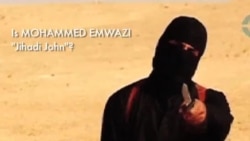Media reports said the masked Islamic State militant who appeared in several videos of hostage beheadings has been tentatively identified -- but security sources caution that the reports may not be accurate.
Reports Thursday quoted friends of Mohammed Emwazi as saying they believe he is the tall, London-accented speaker, dubbed "Jihadi John."
But VOA's Jamie Dettmer, in Rome, said European intelligence sources refused to confirm that Emwazi is Jihadi John, saying instead that the story is more complicated than that.
The man appears in the videos clad completely in black, with a mask over his face and a holster under his arm.
US, British reaction
Two U.S. government sources told Reuters that Jihadi John was believed by investigators to be Emwazi, a fluent Arabic speaker from a well-to-do family who grew up in West London and graduated from the University of Westminster in London with a degree in computer programming.
However, U.S. National Security Council spokesperson Bernadette Meehan said Thursday, "We will not comment on ongoing investigations and therefore are not in a position to confirm or deny the identity of this individual."
The British government and police also refused to confirm or deny the masked man's identity, which was first revealed Thursday by The Washington Post, saying it was an ongoing security investigation.
Emwazi's family declined a request for an interview, citing legal advice, according to the Post.
The masked man later known as Jihadi John first appeared in an Islamic State video in August, in which he appeared to behead American James Foley, although the action was never shown.
He later appeared in beheading videos involving other Western hostages: Britons David Haines and Alan Henning, and Americans Peter Kassig and Steven Sotloff. He also appeared in videos with Japanese hostages Haruna Yakawa and Kenji Goto last month, before they were slain.
Identity sought
Because of the brutal nature of the Islamic State videos, British and U.S. intelligence services were ordered to uncover the identity of the masked man. Authorities used a variety of investigative techniques, including voice and facial recognition as well as interviews with former hostages.
Cage, a civil rights group that works with Muslims in conflict with British intelligence services, has worked with Emwazi since 2009.
Asim Qureshi, the research director at Cage, said that although he could not be certain Emwazi was Jihadi John, there were some "striking similarities."
The International Center for the Study of Radicalization at London's King's College, a leading resource for studying foreign jihadists, said it believed the identity "to be accurate and correct."
"The fact that Jihadi John has been unveiled in this manner demonstrates that whatever efforts are made, the ability to mask one's identity is limited or in fact impossible, and their true identities will eventually be revealed," the King's College research center said on its website.
Beginnings of radicalization
Emwazi, believed to be in his mid-20s, was born in Kuwait and moved to London when he was 6 years old.
Friends and acquaintances said they believe he began to radicalize in the past few years after trips to Africa and the Middle East.
According to media reports, he and two friends were going on a planned trip to Tanzania when authorities detained them upon landing in Dar es Salaam. They were eventually deported.
Afterward, Emwazi was interrogated by British intelligence officers, who accused him of trying to make his way to Somalia, where they believed he had links to a man with connections to the jihadist militant group al-Shabab.
Media reports also said that Emwazi was angered after being barred from flying from London to Kuwait, according to emails he sent to the rights group Cage. In the emails, Emwazi claimed he "had a job waiting for me and marriage to get started" in Kuwait.
The Interior Ministry could not immediately comment on the reports, AFP reported.
The Post reported Emwazi was believed to have traveled to Syria around 2012 and, later, to have joined the Islamic State group.
There was no answer at addresses in London where Emwazi was listed as living.
Jamie Dettmer contributed to this report from Rome. Some material for this report came from Reuters, AP and AFP.






